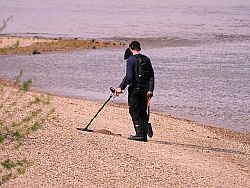

Cadbury's new campaign for a "real treasure hunt" has been temporarily suspended after a massive outcry from archaeologists who said that the advert "encourages illegal excavation and looting".
In one of its latest campaigns, the chocolate giant encouraged children to "grab a metal detector" and dig holes and look for hidden treasures such as silver and gold coins, in heritage sites and protected locations. It might sound innocent, however there are certain legal requirements to "hunting real treasures" that must be met.
The first issue is trespassing - anyone who wishes to carry out metal detecting on land must obtain permission to do so from the owner of the land. Once permission is obtained, detecting and excavating must be done in an orderly manner.
Secondly, on the majority of protected sites such as Scheduled Monuments, Sites of Special Scientific Interests (SSSIs), or land owned by the Ministry of Defence, metal detecting is prohibited without permission of the appropriate authority. There also might be certain agri-environmental arrangements in place that require special permissions and reporting of findings when metal detecting.
Lastly, the Treasure Act 1996 requires treasures of certain specification (such as old Roman or Viking treasures that were the subject of the Cadbury's hunt) must be reported to the coroner and cannot be kept without permission. Anyone who fails to comply with these requirements is guilty of an offence and might be subject to a fine or even three months imprisonment.
Archaeologists and scientists argue that through this ill-advised campaign, Cadbury could have reversed the decades spent trying to promote responsible engagement with archaeological sites. Some even branded the campaign as "theft of cultural heritage".
Metal detecting can be a great hobby if carried out responsibly, it also often helps to discover new archaeological sites. By following the guidelines set out by the National Council for Metal Detecting and making sure detecting is appropriately planned, permission obtained and significant findings reported, metal detecting can at times provide great findings.
For more information on this subject, see: